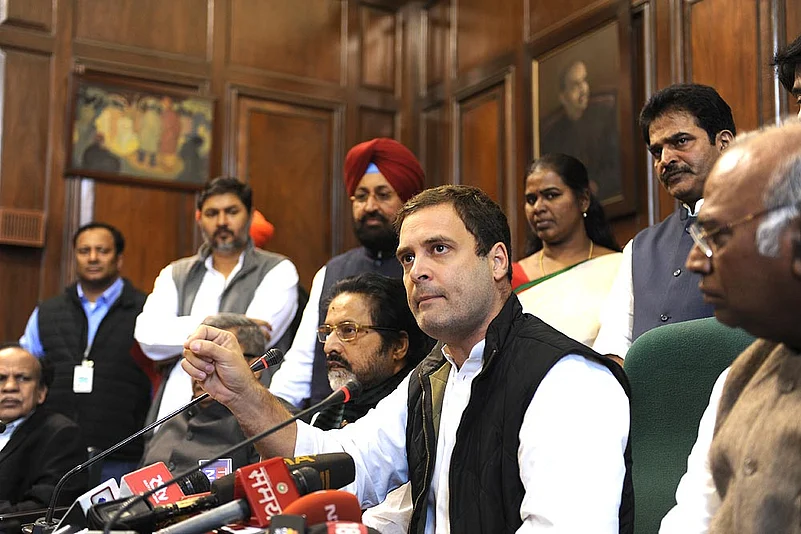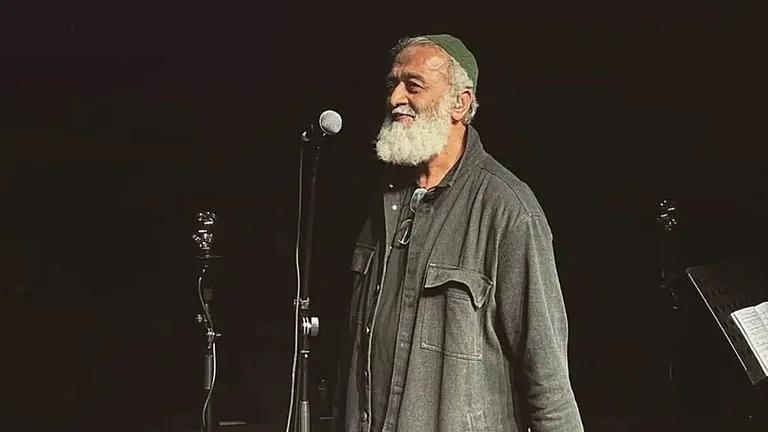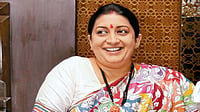Rahul Gandhi, in a span of two days, went from predicting a presumptive “earthquake”, if he were to open his mouth, to making tectonic claims about Prime Minister Narendra Modi’s “personal corruption”. While everyone waited for the tremors, the Congress vice-president chose not to reveal whatever information he had, apparently opting for the safety net of Parliament to speak up. An MP has immunity against defamation for whatever charges he/she makes in the House.
The corridors of power and Congress headquarters were buzzing with speculation about the information Rahul had—from documents “corroborating” details given in the Sahara and Birla diaries that even chief minister Arvind Kejriwal had raised in the Delhi assembly to some ‘incriminating audio clips’ referring to huge amounts of cash being deposited in banks before the November 9 demonetisation.
On December 14, soon after the Lok Sabha was adjourned for the day, Rahul dropped the bombshell. The usual phalanx of BJP leaders tried to make light of his assertions, even ridiculed him openly. Even so, sources say, some degree of panic has gripped the ruling party. “We can laugh it off and call it a joke just because Rahul’s credibility is not too high, but this time he has been consistent in his tirade against the PM,” a senior BJP leader told Outlook.
Rahul had, earlier too, hit out at Modi, but his jibes were few and far between. From referring to the NDA government as “suit-boot ki sarkaar” to terming Modi’s earlier amnesty scheme to bring out black money as “fair and lovely yojana”. Not to be forgotten, “arhar Modi” to take on Modi on inflation—the word on the common lentil variety was a pun on the election slogan of Har Har Modi, Ghar Ghar Modi. This time, Rahul’s persistent attacks have managed to unnerve the BJP, especially since the party leaders themselves are apprehensive about the impact of demonetisation in the forthcoming assembly elections.
The fact that the Opposition seemed to be responding to him has added to the BJP’s discomfort. Demonetisation, which is predicted to shave off up to two per cent of India’s GDP, had given a disarrayed Opposition a handle to unite against Modi. Rahul wanted the Congress to seize the opportunity and lead the charge.
Inside Parliament, two days before the winter session ends on December 16, Rahul sent out word that he had explosive stuff on Modi and would like Opposition parties to join him for a press conference. Remarkably for Rahul, they all agreed. He went on to address the media as the “leader and speaker” of the Opposition parties that comprised the Trinamool Congress and the Left, the two bitter rivals in West Bengal.
His charges were the most upfront among a string of personal attacks he had been making against Modi. Demonetisation had provided him the firepower. A senior Congress leader says Rahul has a single-point agenda—to leverage the public anger against demonetisation that has created a severe cash crunch and become a cause of harassment to the common man, especially those who survived on cash economy.
Ever since Modi announced demonetisation, Rahul has been consistently attacking him. Calling Modi “dictatorial”, he said “one must fight back” as the decision affected poor fishermen, farmers, labourers and artisans. In Allahabad on November 21, as part of former PM Indira Gandhi’s birth centenary celebrations, he said “over-concentration of power is very dangerous, with one man thinking that he can run the country, consulting none”.
A fortnight later, Rahul charged Modi with basing his “entire policy-making strategy on TRPs.” The PM was willing to inflict such “tremendous suffering on people of India to protect his own persona,” he told a Congress Parliamentary Party meeting on December 2. Rahul also used the social media to carry out his aggressive attack on Modi. On December 10, he tweeted: “Modiji people are tired of monologues. I urge you to honestly face the Parliament & answer our questions.”
This is the second time the PM will be facing “personal” allegations, as yet unspecified. Kejriwal, in the assembly on November 16, presented a sheaf of papers he claimed was proof that Modi had been bribed as Gujarat CM—proof that did not wash with the courts. Rahul, too, wants to speak only in the Lok Sabha.
However, given the rules, Rahul may not get the permission to make the charges in the House. While MPs have immunity against defamation, their freedom of speech in Parliament is governed by the rules of procedure of the Lok Sabha. They do not allow an MP to level charges without giving prior notice to the Speaker and the pertinent minister—in this case the PM. The Speaker has the right to deny permission and also to expunge the remarks if the MP goes ahead with the charges.
Rahul “can go on claiming that he is not being allowed to speak inside the House but then that is the rule,” says a BJP minister, not wanting to be named. “What is stopping him from making the allegation outside Parliament? He is indulging in a Kejriwal-like hit-and-run strategy.”
BJP national spokesperson G.V.L. Narasimha Rao terms Rahul’s “unsubstantiated outburst” as “clearly a panic reaction to divert attention from the AgustaWestland case. “Every time Rahul Gandhi opens his mouth, he makes a fool of himself,” he told Outlook. “This time, his tactic won’t work. He will get exposed.”
Congress chief spokesperson Randeep Singh Surjewala was cryptic when asked about the nature of “proof” Rahul claims to have. He pointed to demonetisation: “Pieces of evidence of corruption are unravelling every day, layer by layer…whether it is buying of property in the period immediately before demonetisation or bank deposits. We have asked Modiji to reveal names of all people who made deposits of over Rs 25 lakh but to no avail.”
Two senior Opposition leaders, who were part of Rahul’s press conference, requesting anonymity, admitted that they too did not have any details of the “evidence”. The Congress vice-president had not shared the details with them either.
However, Congress leaders were indeed to be seen going into a huddle to strategise on the way forward. In the evening on December 14, Rahul called a meeting of party leaders, including all general secretaries and a group of MPs comprising legal eagles Kapil Sibal and Abhishek Manu Singhvi, at the Congress ‘war room’ on Rakab Ganj Road, a colonial-style bungalow not far from Parliament.
He is understood to have discussed how the explosive allegations could be brought before the public. Even as some MPs like Shashi Tharoor tried to ask him about the nature of allegations, he did not share the details. Sources said the party was considering another news conference on December 16 to be held at Press Club of India—the same venue where, in 2013 when UPA was still in power, he had famously torn a proposed ordinance seeking to save convicted lawmakers from immediate disqualification.
Congress sources said the leaders at the meeting also discussed the plan ahead—especially on how to tap the people’s anger by “highlighting” the alleged deaths in ATM queues and the “sufferings” of the people due to the note ban. The road ahead for the Congress includes organising rallies, holding demonstrations and marches, giving speeches and creating a ripple around the impact of demonetisation, especially in rural India.
The Congress, after being decimated in the 2014 general election, has stuck to its pet issues around the rural economy to oppose the Modi government’s policies. The party now plans to pitch for a farm-loan waiver. The same day he made charges against Modi, Rahul unveiled at the party’s headquarters nearly 200 sacks that contained petitions from 20 million farmers for a loan amnesty.
Rahul’s political itinerary this month is packed. He is headed to Goa on December 16, a party leader says. Next, he will address two rallies in Uttar Pradesh, a state that goes to polls next year. He is also scheduled to address a rally at Mehsana in the PM’s home-state of Gujarat on December 21—another signal that he is itching to take on Modi. Maybe not for an electoral battle for now, but just a dare.
By Bhavna Vij-Aurora and Zia Haq

























